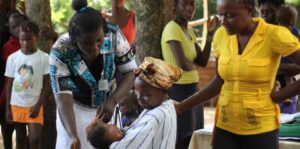What It Does
 For over 60 years, HAS has helped develop a local health system in the rural Artibonite Valley of central Haiti. Inspired by medical missionary and Nobel Peace Prize winner Dr. Albert Schweitzer, an American couple, Dr. Larry and Mrs. Gwen Grant Mellon, founded HAS in 1956. Despite ongoing political and economic turmoil in the country, as well as devastating natural disasters, HAS has continually committed to addressing both immediate health needs and root causes of poor health in the Artibonite Valley.
For over 60 years, HAS has helped develop a local health system in the rural Artibonite Valley of central Haiti. Inspired by medical missionary and Nobel Peace Prize winner Dr. Albert Schweitzer, an American couple, Dr. Larry and Mrs. Gwen Grant Mellon, founded HAS in 1956. Despite ongoing political and economic turmoil in the country, as well as devastating natural disasters, HAS has continually committed to addressing both immediate health needs and root causes of poor health in the Artibonite Valley.
HAS works closely with the local community to develop its health workforce and operate a comprehensive local health network covering 610 square-miles and roughly 350,000 people, including the only full-service hospital for that population. Even before the devastating 2010 earthquake, almost half of Haitians lacked access to healthcare, which has contributed to the highest child and maternal mortality rates in the Western Hemisphere. In some regions, nonprofits such as HAS are committed to serving communities long-term despite such challenges and provide the only local access to health services.
HAS’s network extends far beyond the walls of its 131-bed hospital through its Integrated Community Services (ICS) program. The community health component of ICS includes salaried CHWs (known as agents de santé) who conduct routine visits to all households, nurses who run 70 to 80 mobile clinics, community health volunteers who conduct peer health education, and four health centers that provide basic preventive and curative care throughout the service area. These services are closely linked to the hospital to make up one integrated health network.
ICS also includes community development initiatives to address underlying causes of poor health. For example, to increase access to clean water, HAS’s water, sanitation, and hygiene program builds and repairs infrastructure such as wells, and educates communities on the importance of practices such as handwashing to prevent disease. ICS also includes an agroforestry program to teach communities how to conserve the land that supports local subsistence farmers’ livelihoods. Additionally, HAS hires and trains local people to staff its programs; today, 98% of HAS employees are Haitian.
How Effective Is It
HAS has increased access to and uptake of proven interventions, such as childhood vaccines, treatment for childhood diarrhea, prenatal visits, assisted births, and contraception. According to a HAS study, as a result of this increased access, death rates in children younger than age 5 were 58% lower in the HAS system, as compared to similar areas of rural Haiti. HAS conducts routine monitoring to ensure that its services continue to reach the people it serves. In recent outbreaks of cholera, Chikungunya, and Zika, as well as during the 2010 earthquake, HAS also was able to quickly mobilize staff and resources in response to urgent health needs.
How You Can Help
Lack of nearby modern infrastructure means that HAS is responsible for its own electricity, water, and transportation systems, all while operating its health network. Philanthropic support is vital for HAS to provide quality health services, since local government support does not fully cover certain essential costs, including water distribution, electricity and transportation needed for hospital operations. For example, $3,200 supports the annual salary of a CHW, and $230 covers the cost of a life-saving caesarean section for one woman at HAS’s hospital, where HAS treats all patients regardless of ability to pay. Donate any amount at https://hashaiti.org/.
